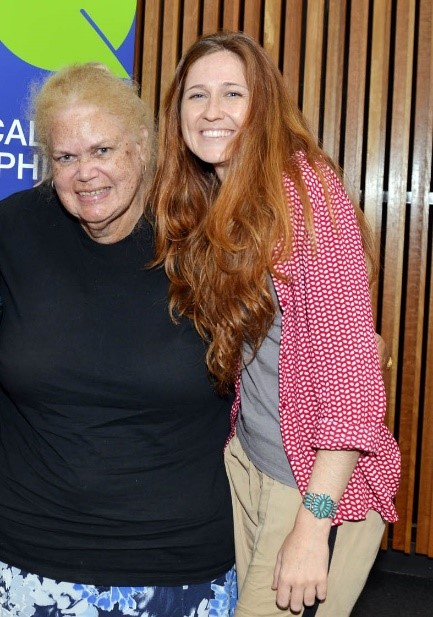UQ Student-Staff Partnerships: Indigenous Ways of Knowing, Being and Doing

Since 2016, when Simone Thornton (PhD student – Philosophy) suggested a panel of three women as the main event for World Philosophy Day (feminist activist Merle Thornton AO, environmental philosopher Freya Mathews, and Aboriginal philosopher Mary Graham), we have been engaging in dialogue with Mary Graham on embedding Indigenous philosophy as part of course design. This was a partnership with Simone and Mary that resulted in the inclusion of Indigenous education in PHIL2700: Philosophy and Education, and Indigenous ways of knowing, being and doing in PHIL3630: Advanced Topics in Moral and Political Philosophy, PHIL1013: Introduction to Philosophy, PHIL3002: Philosophy Today, and PHIL2210: Environmental Philosophy. Mary was a guest lecturer in the latter course and Simone contributed to all courses.
This year we saw a further opportunity in the UQ Student-Staff Partnership (S-SP), an initiative that “seeks to empower students and staff to collaborate in partnership to design, deliver and enhance the UQ student experience, and is underpinned by values such as respect, reciprocity and shared responsibility”.
With the upcoming launch of the Reconciliation Action Plan (RAP), a practical framework for UQ that builds “respectful relationships and opportunities between Aboriginal, Torres Strait Islander and non-Indigenous peoples”, we decided it was timely to co-develop PHIL2210 so that Indigenous Philosophy would have a prominent place in environmental philosophy. So, we contacted Madelaine-Marie Judd, Student Partners Advisor at UQ’s Student Employability Centre, who was very supportive and encouraged us to pursue our project.
We invited undergraduate students who completed PHIL2210 in 2017 to participate in the project. Joining the team were Mercedes Burton and Olivia Jordan, who both co-developed the course with us, along with Mary.
The project sought to understand the implications for curriculum design when embedding Aboriginal perspectives in undergraduate philosophy courses in the School of Historical and Philosophical Inquiry that are listed in other programs across Schools and Faculties. To this end, we chose PHIL2210 as it will be listed in four UQ programs: BA (Philosophy major), BSocSc (Environment and Society major), BPPE, and BEnvMan(Hons).
Previous student feedback (mostly Philosophy and Environmental Management students) indicated the importance of Indigenous content that was included in the course, and after experiencing two guest lectures by Mary as well as set and further reading. In addition, Philosophy students generally have indicated the need to provide alternative philosophical perspectives to that of the analytical and European traditions underpinning Philosophy courses at UQ.
Our task was to embed Indigenous content - epistemology, ontology, values - and methodologies, in the curriculum, and to develop tutorial activities and assessment, all of which are currently UQ priorities. This work builds on existing Australian and International research in the field of collaborative philosophical inquiry as pedagogy, including recent UQ empirical studies initiated by recent PhD graduate Liz Fynes-Clinton (UQ School of Education / HAPI).
The experience for me has been very rewarding in gaining an insight into students’ experiences, so much more than student evaluations could ever provide. It was also invaluable in understanding curriculum design from an Indigenous perspective. In the process, I was introduced to Karen Martin, Aboriginal educator at UQ’s School of Education and colleague of Mary, who engaged in many ‘yarns’ with me on Indigenous knowledge and methodologies. Her book Please knock before you enter: Aboriginal regulation of Outsiders and the implications for researchers and Mary’s article ‘Some thoughts about the philosophical underpinnings of aboriginal worldview’ were invaluable for developing a framework for embedding Indigenous philosophy.
I was very pleased this year to see how many students in both PHIL1013 and PHIL3002 used Mary’s article for their essays, and particularly the number of students in PHIL3002 who chose to write their essays on Aboriginal Philosophy especially its relation to environmental philosophy. This is an indication that many students are wanting philosophy to be more inclusive regarding Indigenous knowledge, ontology and values, as well as methodologies, and to gain an understanding from an Indigenous perspective rather than through Western ways of knowing!
Gilbert Burgh, Simone Thornton, Olivia Jordan & Mercedes Burton
